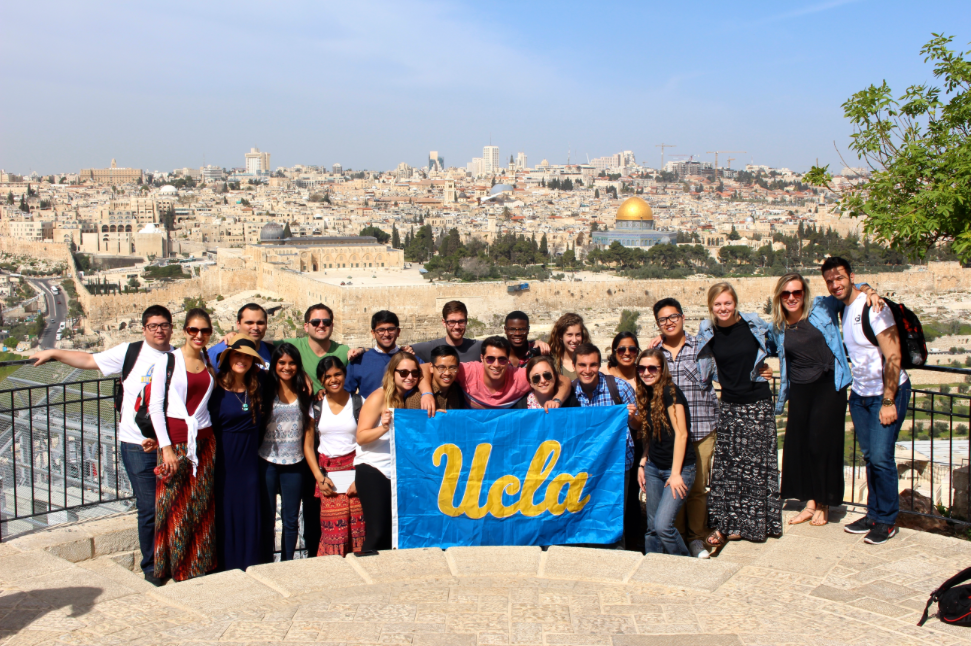Written by Yair Vardi, Israel Fellow at Hillel at UCLA
This week, we read parshat Shelach Lecha — שְׁלַח לְךָ. This is the famous parashah of the spies. Moses chose twelve men, leaders from the twelve tribes of Israel, to scout Eretz Israel, while they were wandering “in the desert” (Bamidbar במדבר — the Hebrew name of the book of Numbers, which contains this Torah portion). These men acted as Shlichim, as Emissaries, on behalf of the people of Israel.
For the past two years I was also a Shaliach to the amazing Jewish community of Hillel at UCLA. Many times I’ve asked myself: What does it mean to be a Shaliach, an Israel Fellow? What’s the purpose of my Shlichut? Who do I represent? And most importantly, as a Shaliach, what is my message?
Moses gave clear instructions for what the Shlichim are supposed to do. He told them to explore three areas: the topography of Israel, the strength of the people who dwell in the land, and the strength of the cities. They brought with them the fruits of Israel. At first when they returned to Moses, they began their report with some favorable words: בָּאנוּ אֶל הָאָרֶץ אֲשֶׁר שְׁלַחְתָּנוּ וְגַם זָבַת חָלָב וּדְבַשׁ הִוא וְזֶה פִּרְיָהּ: “It indeed does flow with milk and honey…” But with that said, ten out of the twelve came back with bad news regarding the Promised Land: “The people within the land are fierce, and the cities are very strong and fortified…moreover we saw giants in the land.” When Caleb, one of two spies who spoke only positively, said, “We shall surely go up to the land, for we are surely able to conquer it,” the spies became even more pessimistic, saying, “Other nations are stronger than us… this is a land which consumes its inhabitants! ”(“.אֶרֶץ אֹכֶלֶת יוֹשְׁבֶיהָ הִוא”)
The spies’ message caused panic and fear in the community. In anger, God punished the Children of Israel to wander the wilderness for forty years. All but Caleb and Joshua, who had given positive reports, were to die in the wilderness so that the next generation could enter the Promised Land.
Reading this story today, I still wonder: What was so wrong with their message?
They reported critically and conveyed their honest assessment regarding the geopolitical realities in the land. They most likely wanted only the best for their community and families, and they were truly concerned about their safety. Isn’t it human nature throughout history to be afraid of the unknown? Aren’t we all guilty of prejudice sometime and might we not consider “the other” / ”the enemy” to be “giant people living behind fortified walls”?
So here is my answer and my own interpretation for why the ten spies were still wrong. It is because they didn’t include key ingredients in their message for the community, which are still relevant today: hope and faith for a better future. They were wrong not to believe that one can determine its own future. They couldn’t believe that the people of Israel were able to change the reality of the land of Israel and define their own path.
Today, 3000 years later and a 15 hour flight from LAX, between the Jordan River and the Mediterranean Sea, the reality is not so different and still very complex. The descendants of the children of Israel (Jacob), grandson of Abraham, and the descendants of Ishmael (Ismaeel), a son of Abraham, share one small piece of land the size of LA County. Two nations, people who struggle with God, on behalf of God and between each other. It is a complicated reality, sometimes one of milk and honey, Apple and Google, and sometime of fortified walls and the Iron Dome.
We are fortunate to live in times when we all have the opportunity to scout Israel. Over the past two years I’ve led more than 120 Bruins in Israel, and I know of dozens who will spend this summer in my homeland. These personal and communal experiences make every student and each and every one of us a potential Shaliach.
My message this Shabbat is for all of us to be Shlichim. Like those ten spies who were punished, we should think critically about the realities on the ground (in Israel and in our own community) and we should ask some tough questions. But most importantly — like Caleb and Joshua, we should imagine the potential of our community to define a better future, for us here in the US and across the ocean in Eretz Israel.”טוֹבָה הָאָרֶץ, מְאֹד מְאֹד” — the land is very, very good.
I know words are important, especially at UCLA, but I want to ask you this Shabbat to take action as well: let’s aspire to be activists and entrepreneurs, as individuals and as part of a larger movement. As we finish this academic year, and some of us graduate together, let’s translate our experiences and work together to change the reality of our society, to make it better and just.
B’hatzlachah (“Great success”), Shabbat Shalom, and Drishat Shalom from Israel.
______________
This article is part of Ha’Am’s Friday Taste of Torah column. Each week, a different UCLA community member will contribute some words of Jewish wisdom in preparation for Shabbat.

